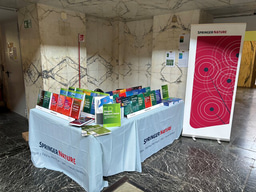How Lived-Experience Narratives Could Transform Dementia Support
Published in Sustainability, General & Internal Medicine, and Mathematical & Computational Engineering Applications

We increasingly talk about “patient voices” in healthcare, yet systems rarely give these voices genuine influence. For people living with dementia, this gap is especially significant: their needs are usually interpreted through carers, professionals, assessment tools, or cognitive measures rather than through their own accounts. This raises an important question: how often do we truly listen to the stories people tell about their identities, emotions, and everyday lives—and how might these stories support others living with dementia?
The Lived Experience Narratives in Dementia (LEND) Programme is based on the belief that the stories already being shared by people with dementia may themselves act as a form of support. These narratives are found across the voluntary sector—in blogs, podcasts, video diaries, and peer-led forums. They are emotional, personal, and frequently insightful, yet they remain largely invisible within research, education, and clinical practice. No intervention has yet attempted to use these lived experiences to improve wellbeing, empowerment, identity preservation, or shared understanding. LEND aims to change this (NIHR 206255)
Stories matter because dementia affects not only cognition but also identity, agency, and social belonging. People often experience diagnosis as a threat to how they are seen or as something requiring denial to protect their sense of self (Villar et al., 2019). Peer-shared narratives can therefore offer something unique:
• Validation: “that happened to me”
• Hope and practical guidance: “I managed this by…”
• Recognition of identity beyond diagnosis: “I am a gardener”
• Cultural representation and diversity: “other people like me exist”
Narratives perform emotional and social work, yet this remains under-examined (Li et al., 2022). LEND aims to explore how lived experience can be developed into a safe, ethical, and culturally responsive digital intervention that improves wellbeing and supports person-centred understanding.
How the LEND study works
LEND is an NIHR-funded mixed-methods study led by the University of Nottingham, sponsored by Nottinghamshire Healthcare NHS Foundation Trust, in collaboration with the Geller Institute of Ageing and Memory (University of West London), the Centre for Ethnic Health Research (University of Leicester) and the University of Bangor
Our approach unfolds across three phases, known as Work Packages (WP):
Mapping: What stories already exist and what impact do they have?
We are analysing publicly available narratives from dementia charities and advocacy organisations. This includes video diaries, blogs, and online forums as well as the conversations held in our Lived Experience Advisory Panel (LEAP) group. We are asking:
-
- What emotions and themes do people share after diagnosis?
- How do people talk about identity, culture, stigma, fear, and resilience?
- How do different communities express their experiences, and what may be missing?
- What impact do specific type of stories have on people living with dementia?
- How can stories support people?
People with dementia, carers, and community groups will help design how these narratives can be safely shared, adapted, and supported. This all contributes to our understand of LEND theory. Crucially, the Centre for Ethnic Health Research will help address under-representation by engaging diverse cultural groups and providing interpreters where needed. Too many dementia studies focus on majority populations - this project will not.
Co-production: How will the online LEND intervention work?
We are working together with people who have lived with the experience of receiving a dementia diagnosis or for caring for someone with dementia. These people make up the LEND Lived Experience Advisory Panel (LEAP), and they provide researchers with insights into how the online LEND intervention prototype should change, exploring how it might enhance the quality of life, wellbeing, identity, confidence, and decision-making for people living with dementia.
How ‘useful’ is the Online LEND Intervention?
The final stage explores whether it is feasible to take the Online LEND Intervention to a full-scale randomised controlled trial (RCT). In this part of the LEND programme, a mini RCT is performed using the same or similar methods to what we would use on a full-scale RCT. By the end of this part, we will know if it is feasible or not to do a full RCT.
Re-thinking ethics in narrative research
One of our most important tasks is to build an ethical framework around using narratives that may already be public. Public does not always mean freely usable. Many people share stories thinking only of the audience in front of them. Respecting their intent requires:
-
- The choice of anonymisation as well as the freedom to keep your identity
- Responsible interpretation
- Copyright and data-sharing safeguards
- Transparency about how narratives are used
- A focus on protecting dignity
This is why co-production is essential. We are not simply taking stories and repackaging them; we are building an intervention with the communities whose voices form its core.
Why representation matters
Experiences of dementia differ across cultures, languages, and belief systems. In some communities, dementia is seen as shameful or even hidden. In others, it is reframed as part of ageing rather than a medical condition. Some may have limited access to specialist care, or face mistrust in healthcare institutions. A narrative-based intervention that excludes these voices risks reinforcing inequalities.
LEND is therefore working proactively with under-represented groups, not just to add diversity as an afterthought, but to ask how cultural context shapes what “support” should look like in the first place. A story that helps one community might deeply distress another. The intervention must adapt to people, not the other way around.
What makes LEND different?
Most dementia interventions focus on cognition, symptoms, or carer burden. LEND focuses on identity, emotion, and social meaning. Instead of asking how to reduce decline, LEND asks:
How can we help people live well, be heard, and maintain who they are, their sense of identify and self?
By foregrounding lived experience, we shift power back to the people most affected. We stop treating them as data sources and start treating them as experts. Our hope is that this approach will change not only the resources available, but also how dementia services think about the value of patient narratives in shaping care.
Where we go from here
LEND envisions a future in which lived experience stories are not scattered across the internet, inaccessible, unvetted, or lost. Instead, they could be:
-
- curated ethically
- culturally reflective
- emotionally supportive
- clinically recognised
- grounded in co-production
The Online LEND Intervention tool could be used for many things, including:
-
- supporting people living with dementia and carers
- training professionals within health and social care
- providing information about what it means to have dementia
- providing useful resources for under-served individuals and communities
- preserving the self-identity
- feeling less alone
A person newly diagnosed with dementia could access stories that help them understand themselves within a community of lived experience, not as a symptom profile, but as a person whose life still has agency, connection, humour, fear, frustration, love, and possibility.
A final reflection
Dementia challenges cognition, often memory, but it does not erase the voice or humanity of those living with it. Too often, healthcare professionals speak for people. LEND asks what could happen if, instead, we listened, not just to gather data, but build something new.
Stories have always helped us, human beings, navigate through society and health; through illness, grief, and identity. It is time to treat the experience of people that have lived with dementia not as by-products, but as tools for wellbeing in their own right. Their experience and their stories might just change everything.
Want to take part in the LEND Trials?
Visit: www.dementianarratives.org
Email: LEND@nottingham.ac.uk
Mobile: 07791598280
Follow the Topic
What are SDG Topics?
An introduction to Sustainable Development Goals (SDGs) Topics and their role in highlighting sustainable development research.
Continue reading announcement


Please sign in or register for FREE
If you are a registered user on Research Communities by Springer Nature, please sign in